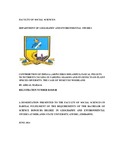Please use this identifier to cite or link to this item:
https://cris.library.msu.ac.zw//handle/11408/366Full metadata record
| DC Field | Value | Language |
|---|---|---|
| dc.contributor.author | Mabasa, Abigal | - |
| dc.date.accessioned | 2014-08-27T15:08:34Z | - |
| dc.date.available | 2014-08-27T15:08:34Z | - |
| dc.date.issued | 2014 | - |
| dc.identifier.uri | http://hdl.handle.net/11408/366 | - |
| dc.description.abstract | A study to assess the contribution of impala (Aepyceros melampus) to nutrient cycling was conducted in Mukuvisi woodland, a Nature reserve in Harare. The aim of this study was to assess the contribution of impala faecal pellets to nutrient cycle of Mukuvisi Woodland. In this study stratified random sampling method was used to assess decomposition rate of impala faecal pellets in two seasons (summer and winter), and also to determine the amount of soil nutrients contributed by impala faecal pellets into the nutrient cycle. Two zones were sampled and these zones were selected according to soil type, 10 samples were selected in each zone. The mean decomposition rates showed that there was high decomposition rate in sand zone than in the gravel zone. Also overally soil nutrient content was observed to be high in the sand zone than in the gravel zone. This showed that impala faecal pellets contribute to soil nutrients. The t-test results indicated that soil type significantly influences (p<0.05) rate of impala pellet decomposition. Thus the hypothesis that soil type does not influence impala faecal pellet decomposition rate was rejected in favour of the hypothesis that soil type influences decomposition rate. This research recommends that Mukuvisi Woodlands staff and National Parks Authorities should further studies focusing on the influence of animal wastes of various species on soil nutrient within the woodland so that they know which animal species to keep in order to enhance soil nutrient content since it’s a small woodland. | en_US |
| dc.language.iso | en | en_US |
| dc.publisher | Midlands State University | en_US |
| dc.subject | Plant species diversity | en_US |
| dc.title | Contribution of impala (Aepyceros melampus) faecal pellets to nutrient cycling in varying seasons and its effects on plant species diversity: the case of Mukuvisi Woodland | en_US |
| item.languageiso639-1 | en | - |
| item.fulltext | With Fulltext | - |
| item.grantfulltext | open | - |
| Appears in Collections: | Bsc Geography And Environmental Studies Honours Degree | |
Files in This Item:
| File | Description | Size | Format | |
|---|---|---|---|---|
| R10494R.pdf | 626.59 kB | Adobe PDF |  View/Open |
Page view(s)
18
checked on Jul 26, 2024
Download(s)
4
checked on Jul 26, 2024
Google ScholarTM
Check
Items in MSUIR are protected by copyright, with all rights reserved, unless otherwise indicated.



